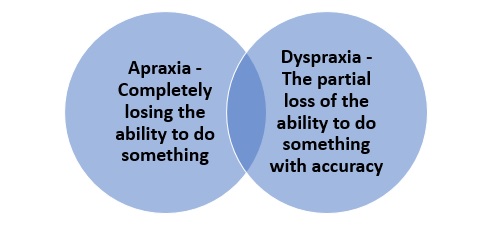
Did you know that Childhood apraxia of speech (CAS) occurs in 1-2 children per 1,000?
Childhood apraxia of speech (CAS) is quite rare. Mostly, it affects more boys than girls and happens more often in kids with galactosemia, fragile X syndrome, and Down Syndrome. Sometimes it is also called verbal dyspraxia. Experts say it is a speech ailment in which the brain has a problem in getting the tongue, lips, and jaw to move properly for talking.
The fact is kids with CAS know what they want to say already, but they can't manage the muscle movements required to make the sounds, syllables, and words.
Difference Between CAS, Developmental Verbal Dyspraxia and Developmental Apraxia of Speech
Well, all of these do refer to the same condition and these three terms are used by experts interchangeably. Childhood apraxia of speech can affect any kid.

It is very important to note that children with apraxia also may have other language delays, problems with motor skills and coordination, difficulties in learning to read, write, and spell and so on. They require assistive devices or alternative communication approaches to aid them in class.
What causes childhood apraxia of speech?
CAS can be congenital, or it can be developed throughout speech development. Unfortunately, the exact cause is unidentified till now. In kids who have CAS, the messages from their brain to the parts of their mouth used for speech are not being sent properly. Sometimes, CAS can be the result of a developed brain injury, like a stroke, which roots nerve pathway disruptions in a child’s brain. Some evidence also disclosed that genetic conditions can lead to a CAS analysis. Studies also show that a mutation of the FOXP2 gene leads to a form of CAS.
How to identify if your student has childhood apraxia of speech?
Consider these following red flags or symptoms ---
Apart from the above-mentioned symptoms, some more co-occurring characteristics are –
Several children with childhood apraxia of speech (CAS) have other complications that affect their aptitude to communicate.
What You Can Do?
As a skilled special education teacher, it is very important for you to work with speech-language pathologists as well as families to help ensure learners get the appropriate support. As CAS can affect various features of a student's education along with academic performance, thus, always try to keep your students with apraxia involved in the classroom.
It is also essential to remember that some children may also have additional coordination problems. Provide students with some extra time to do assignments and plenty of time to communicate their requirements. Also, remember, these children are at high risk for bullying, just like several other students with various special needs. Try to generate opportunities for association and friendships with classmates.
Giving your student the needed support as he/she grows is the best way you can take care of children diagnosed with apraxia of speech. There is no way to stop childhood apraxia of speech however, with the proper knowledge and skills that you will receive from our online special education courses, you will be able to accommodate these kids in a better way.
Usually, doctors and experts suggest multiple repetitions and repeated practice of sound sequences, words and phrases during therapy sessions. The use of different visual promptings shows how speech sounds are made as classifications of sounds are collective into words. Doctors also suggest considering the CAS as a language learning disorder. These several approaches teach children how to make speech sounds along with the rules for when speech sounds and sound systems are used in a language. Kids with CAS receive frequent and intensive one-on-one therapy, personalized to their exact speech and language needs.
To End With
To conclude, we can say that identifying and treating childhood apraxia of speech at an early stage may decrease the risk of long-term tenacity of the problem. The online special education courses prepare you to handle and support special needs children in an effective way.
Looking for earning a special education teacher training certification? If yes then call us at +91-6292150868 or drop a mail at asiancollegeofteachers@gmail.com. Chat with our expert if you have any questions, send us an email to find out more.
Get In Touch
UK – Registered OfficeAsian College Of Teachers Ltd (UK)
27, Old Gloucester Street, London – WC1N 3AX, UK
UK Toll Free:Â 0-808-189-1203
www.asiancollegeofteachers.co.uk
All SEN Courses are designed, developed and created by Asian College of Teachers Ltd, United Kingdom. These courses are certified by CPD Certification Service UK and endorsed by NCC Education, UK, and Short Courses from CACHE, UK through Laser Learning UK.
Asian College of Teachers (ACT) undertakes a continuous review of its teacher training courses to ensure imparting high quality education. However, there might be circumstances outside of ACT’s control which might affect its stakeholders like if you are planning to teach in a different country, applying for a teaching license, pursuing higher studies or trying to get the certificate approved by the Ministry of Education (MoE) of a particular country then you can do so with the certificate issued by Asian College of Teachers (ACT). However, each country’s Ministry of Education (MoE) or educational bodies set certain standards that are indispensable for the pursuit of higher studies or teaching in schools in that country. So it can be a possibility that you may be able to use the certificate for higher studies or teaching purposes in one country and not in another. Therefore, we strongly recommend that you investigate thoroughly and check with the relevant authorities regarding the acceptance of the certificate issued by us before you enrol on a particular course. ACT strives to offer high-quality education and its certificates can be valuable for various purposes internationally, but still it is crucial for individuals to verify the specific recognition of the certificate in the country they intend to use it, especially for formal education or professional licensing purposes. This approach ensures that the stakeholders make informed decisions regarding their educational and career paths.
© 2025 Asian College of Teachers. All Rights Reserved. Asian College Of Teachers is a trading brand of TTA Training Pvt. Ltd (India) - CIN U80902WB2016PTC215839, Asia Teachers Training Co., Ltd (Thailand) - Registration No. 0105558193360, Asian College Of Teachers Ltd (UK) - Company Number 9939942 & Asian College Of Teachers LLC, (USA) - Federal Tax Identification Number 30-1261596
Designed by kreativewebtech